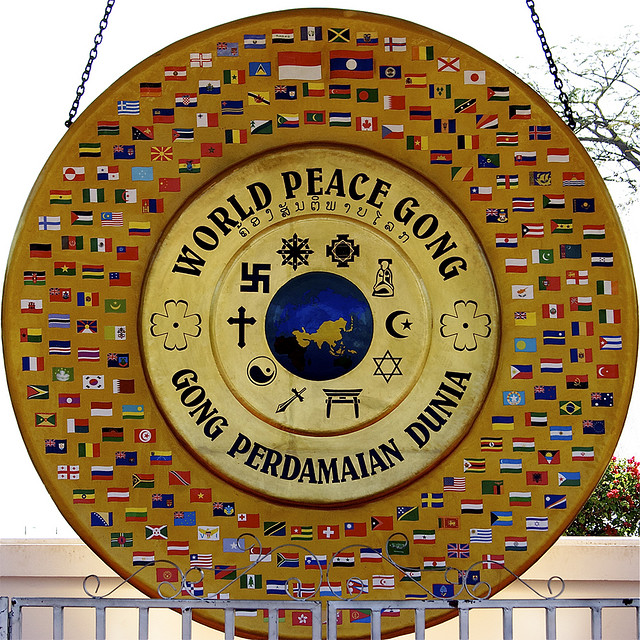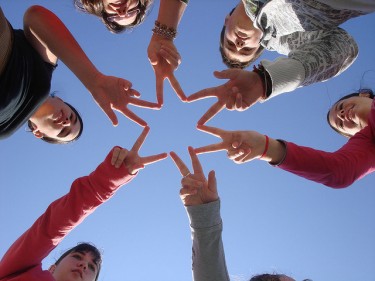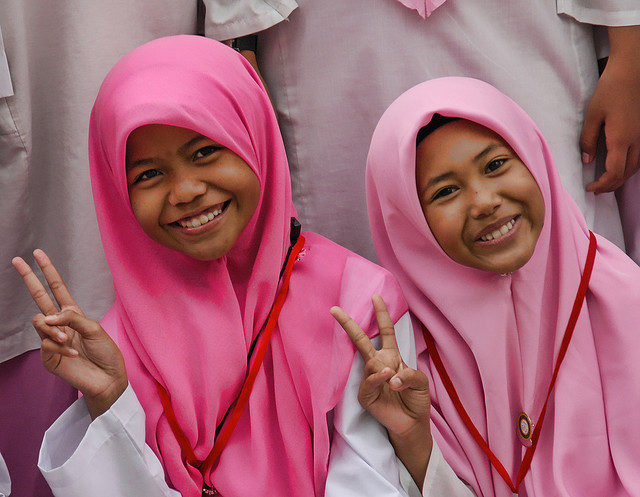Every year since 1982, people all around the world join forces on September 21, the International Day of Peace, to show their own commitment to worldwide peace and to work in cooperation for this goal. Events around the world range in scale from private gatherings to public concerts, and online initiatives.
Among these, there is The SunFlower Post, a new project [1] where young females from different parts of the world write local news from a gender perspective. Their bloggers have chosen worldwide peace as the theme of the month, as the Editor in Chief, and Global Voices author [2], Andrea Arzaba explains [3]:

Our bloggers will be writing about different issues towards Peace with a gender and local perspective. Do not miss this opportunity to learn about their countries. Let’s create a space for multicultural discussions and understanding.
Kicking off the series from Mexico, Andrea Arzaba comments on the last yearly governance report speech given by the president, and his focus on the future. She advocates that for a country to achieve future peace, it is necessary to focus on the actions of now [4]:
Calderon focused on the drug war problems and situation that has grown during his presidency, as well as the economical crisis that Mexico faces. He focused on insecurity, on the moment of confusion and sadness that people are living today. He focused on “a better tomorrow”. But … what about today?
I felt he did not gave importance on his actions for achieving peace, which is crucial at this moments of uncertainty. I believe his intentions are good – trying to defeat drug-dealing crimes, but we need to pay attention on the roots of the problem.
Educated children and values are crucial to achieve peace. When we have young people involved in the drug war this is because they did not have a proper education, they did not have enough opportunities to do something else and earn money in a different way. They are inside this cycle, one that will not let you get out easily.
From China, Amily Yang points out that traditional Chinese wisdom like Dao and Zen can be recipes to achieve inner-peace. Paradoxically, reflecting on a recent high-speed train crash that killed more than 35 passengers, she laments that this wisdom is barely present in the fast-paced China of today. She challenges her fellow Chinese to slow down in order to find inner peace [6]:
The high-speed train was supposed to be a gift for the nation, yet officers were getting commands to fasten the project. One example is that a driver only spent 10 days learning – and normally it would take him about 3 or 4 months in training.
EVERYTHING is fast in China. Students hurry to find a job and get promotion, workers hurry to make more products, women hurry to find a husband and get married, officers hurry to make the GDP number shining and good for their promotion. We are moving towards a better society, for we think we are moving faster and developing.
Yes, developing is the key word, especially when an economy is emerging. That is the only focus today for the country.
“Please my China, slow down and wait for the people to follow up, do not focus too much on just hurrying up.” is a popular phrase, widely spread.
We have peace now, with no war or conflict in the country.
We have peace now, so that the State focuses on developing our economy.
But how about inner peace? Could the State somehow slow down a little bit, to catch up with what the citizens really need, as family values, as food security, as trust among the nation, as no corruption. Are people allowed to slow down a little bit, to find peace?
That could also be a question for individuals. I dare you slow down, to make a choice among all the good stuff you desire, and find what you really care for? To find your inner peace…
Where Does Peace Begin? [7] This is one of the eternal questions that Natalia Semicheva constantly asks herself. She is from Russia, a country that according to the Global Peace Index 2011 occupies 147th place among 153 peaceful states, this means a high level of violence and crime. She argues that the more aggressive you are, the more you start to understand peace:
Not in the UN resolutions, but in our families. Peace should come from your mother’s hug, from your husband’s kiss, from the first steps of your child. We should start focusing in our relatives and friends, respecting our parents, taking care of our children. Before loving humanity, we should first learn to love each other in our little family world. Only then we could share that inner peace with everybody that we meet in our life.
From Turkey, Neslihan Çiflik wonders about the end of war [9]:
I haven’t been present in any period of war during my life. I’m watching death like watching a movie on TV. My consciousness can’t accept reality. Even I can’t put myself in their place. I can’t think that it could also happen to me.
Unfortunately, there is war with or without guns.
It’s embarrassing to sit safely at home and write a letter of peace.
You know why? Because it sounds terrible that a human is killing some other, more than when someone is killed somewhere, far away. I’m not dying with this dying person. I’m getting dirty with the killer and I’m carrying this disgrace in my skin, in my blood.
Maybe I’m collapsing someone’s safe house, stealing his or her breath and his or her smile in this world. And maybe stealing her children’s smile as well.
I couldn’t believe that I can do or may do all of these. It’s a terrible shame.
This can’t be our aim to be born. My existence can’t give any pain to another person.
According to me that war is unbelievable from these sides. People die of disease or disaster. But this is not a disease, this is not a disaster, this is not faith.
Why do I do this? Our old world needs peace. Human, nations, environment, animals and herbs, and states are tired.
Finally, Anna Zemblicka from Latvia remembers August 23, 1989, the day two million Estonians, Latvians and Lithuanians joined hands to form a massive human chain. It was The Baltic Way that Moved the World [10]:
The Baltic Way encouraged democratic movements throughout the Soviet Union and with it, international society payed attention to the Baltic region in a great extent. Within a year and a half, all three Baltic countries formally declared their independence. By September 1991, the world’s governments recognized their independence.
Historians and other experts claim that the Baltic Way “created a precedent that was and hopefully will be, followed by a number of countries all over the world – the triumph of humanity over totalitarianism in a peaceful way”.
The The SunFlower Post will publish more stories throughout the month. Check back at the website or follow the project on Twitter [11] and Facebook [12] to read what bloggers from other countries will add to the peace series.

Photo by Fabio Gismondi (CC BY-NC-SA 2.0)
Peace Day is an opportunity for reflections on individual and planetary progress toward peace, and time for “commemorating and strengthening the ideals of peace both within and among all nations and peoples”, as the U.N. Resolution that established the International Day of Peace [13] explains.

